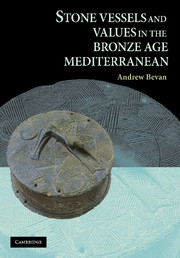Book contents
- Frontmatter
- Contents
- Acknowledgments
- 1 Introduction
- 2 Agreeing on Things
- 3 Moving People, Objects, and Ideas
- 4 Making Stone Vessels
- 5 The Third Millennium
- 6 The Earlier Second Millennium
- 7 The Later Second Millennium
- 8 The Rough and the Smooth: Stone Vessels from a Comparative Perspective
- 9 Forging Value and Casting Stones
- Appendix
- Notes
- Bibliography
- Index
2 - Agreeing on Things
Published online by Cambridge University Press: 14 August 2009
- Frontmatter
- Contents
- Acknowledgments
- 1 Introduction
- 2 Agreeing on Things
- 3 Moving People, Objects, and Ideas
- 4 Making Stone Vessels
- 5 The Third Millennium
- 6 The Earlier Second Millennium
- 7 The Later Second Millennium
- 8 The Rough and the Smooth: Stone Vessels from a Comparative Perspective
- 9 Forging Value and Casting Stones
- Appendix
- Notes
- Bibliography
- Index
Summary
Value is a term that cries out for careful definition. It has a curiously ambivalent semantic wer, referring to both tangible and intangible culture, to objects that we think of as commodities and those that we do not, and to meanings that we think of as personal and those that we treat as collective social givens. Indeed, object value arguably inhabits exactly this social space, an interface between what we assume to be objective and what we recognise as subjective (Simmel 1900). This is reflected nicely by the fact that the terms people often use to describe this domain—for example, in English, value(s), taste, worth—evoke wider social mores, natural sensory skills, or even innate moral rules but thereby often conceal definitions that are potentially vulnerable and up for negotiation (Bourdieu 1994: 99). This chapter considers these rather ambiguous meanings, the way object value may reflect the wider ordering of human relations, and how, if at all, it might manifest itself archaeologically. Some of the issues raised are declared merely to make the analytical preoccupations of Chapters 4–8 more transparent, while others are revisited directly in later analyses, particularly in Chapters 8 and 9.
Value is not something inherent in things but is a culturally constructed property.
- Type
- Chapter
- Information
- Publisher: Cambridge University PressPrint publication year: 2007



